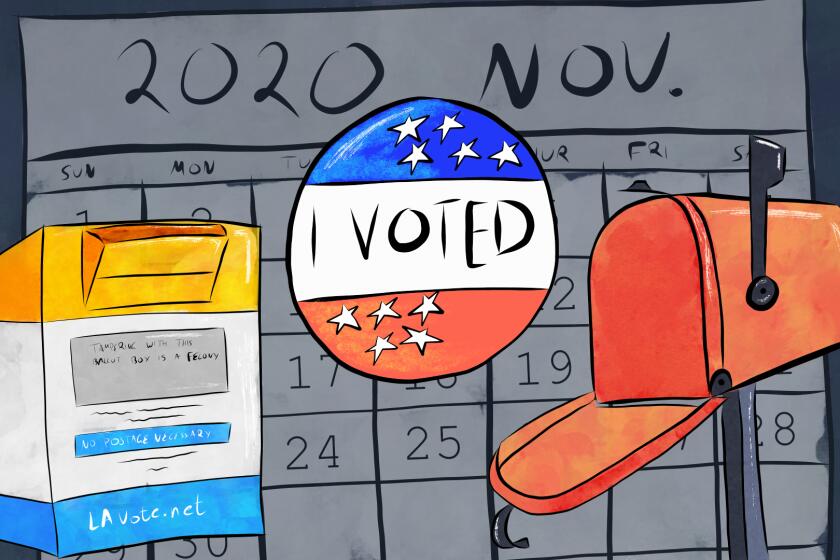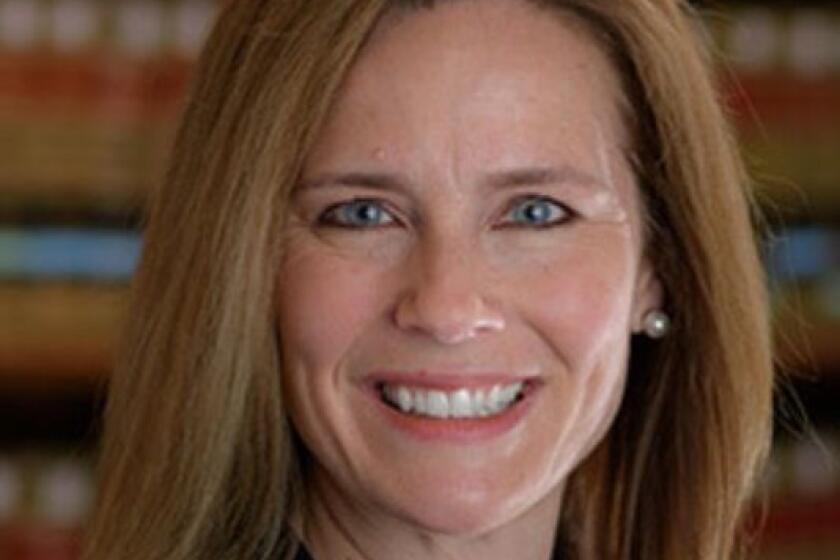As he pushes a Supreme Court nominee, Lindsey Graham scrambles to save his own reelection

- Share via
COLUMBIA, S.C. — The Confederate flag flew over the state Capitol here until just five years ago. No Democrat has been elected statewide for more than two decades. President Trump won the state by 14 percentage points in 2016.
But in conservative South Carolina, the most unlikely battleground in Republicans’ struggle to retain control of the Senate, Sen. Lindsey Graham is in the fight of his career. He’s counting on Trump’s nomination of Amy Coney Barrett to the Supreme Court — and the hearings he’ll preside over as Senate Judiciary Committee chair, starting Monday — to act as a political lifeline, uniting conservatives behind him.
Polls show the three-term GOP senator in a dead heat with his opponent, Jaime Harrison, who is reaping a windfall of contributions from donors across the country. The astonishing $57 million Harrison raised in the last three months was more than any Senate candidate had ever raised in one quarter. In another sign of how nationalized the race has become, as of August, both candidates had raised more money in California than in their home state.
The battle pits one of President Trump’s most loyal allies against a young Black Democrat who, if he won, would make this racially polarized state the first to have two Black senators (the other is GOP Sen. Tim Scott).
Graham sees his reelection struggle as payback for his role in advancing Brett M. Kavanaugh onto the Supreme Court two years ago and helping Trump cement a conservative judicial majority.
“This isn’t about Jaime Harrison,” Graham said when the candidates debated here Saturday. “It’s about liberals hating my guts when I stood up for Kavanaugh and tried to help Trump. This election is about trying to take me out.”
But Graham’s problem is not just that Democrats have turned Harrison into a national cause célèbre. He has also struggled to rally his own party. In the last four years, he’s flip-flopped from one of Trump’s most vociferous critics into an ally so close that Graham was one of the first senators to talk to Trump after he tested positive for COVID-19. The abrupt shift has exacted a political price.
Now, in an era when few voters split their tickets, Graham’s fortunes hinge heavily on Trump’s. Because Trump remains popular in South Carolina, he continues to have a strong shot. But even here, Democratic nominee Joe Biden has gained ground. With Graham running a few points behind Trump in polls, the outcome of the Senate contest remains in doubt.
The Senate election is increasingly nationalized, and even well-known incumbents face a powerful tide as money pours into Democratic campaigns.
Graham’s reliance on the Barrett nomination to solidify his conservative support was obvious in his debate with Harrison, as he repeatedly mentioned his role in shepherding the nomination even in response to a question on another topic.
“If you want conservative judges, I’m your only bet in this race,” he said.
Graham also warned conservatives that his reelection was key to continuing GOP control of the Senate.
“The nightmare scenario for our state is if they keep the House, take over the Senate and Biden is president: God help us all,” Graham said. At another point, he referred to Democrats as “nuts.”
Harrison, former chairman of the South Carolina Democratic Party, has run a policy-light campaign that highlights his life story. Raised in poverty in rural South Carolina by his grandparents, he won a scholarship to Yale, became a lawyer, then joined the world of lobbying and Democratic politics.
“I’ve lived the American dream,” Harrison said at the debate.
Harrison has been helped by the surge of activism among voters of color that has lifted many Black candidates this year amid a national reckoning over racism.
“Jaime is the best Democratic candidate anyone has seen here in a long time,” said Matt Moore, former South Carolina GOP chairman. “He is running in a cultural moment that seeks to rectify many old wrongs, and the moderate voters recognize that fact.”
Harrison has broken state fundraising records. His campaign has spent more than $46 million on television ads this year as of early October — more than three times as much as Graham, according to Advertising Analytics. Harrison has so clogged South Carolina airwaves that, in one ad-packed hour on a local station recently, the same Harrison ad ran twice, back to back.
Harrison said he sees his success so far as a sign of a “New South” more welcoming to Democratic candidates.
“When you invest in candidates and actually put candidates on the field who reflect the values and talk about the issues that are important to people, you can compete,” Harrison said in a phone interview from his home in Columbia. “We have to stop neglecting the South.”
But his challenge may end up being like Stacey Abrams’ Georgia gubernatorial bid and Beto O’Rourke’s Texas Senate challenge in 2018 — well-funded and surprisingly strong Democratic efforts that fell a few points short.
Voters of color make up about 30% of South Carolina’s electorate and are overwhelmingly Democratic. The state’s white majority has been heavily Republican for years. To win, a Democrat needs a large turnout of Black voters plus something close to 4 in 10 white voters. In a state where voting along racial lines has long been the norm, the math is tough.
Part of what has helped Harrison is Graham’s maneuvering to adapt to the Trump era: No other Republican has executed a Trump-era transformation as eye-catching and vividly documented.
When he ran for the GOP presidential nomination in 2016, Graham called Trump a “race-baiting, xenophobic religious bigot” and “unfit for office.” That fueled conservative suspicions that were already high because of Graham’s record as a dealmaking pragmatist and a sidekick of maverick GOP Sen. John McCain of Arizona.
Graham changed his stand after Trump won and McCain died. He explains his conversion as an act of pragmatism.
“So, I lost, and he won,” Graham said this summer at a campaign office. “I like the direction President Trump has taken us, on policy, and I think the people of South Carolina did not want me to take my ball and go home.”
Amy Coney Barrett, President Trump’s nominee to fill Ruth Bader Ginsburg’s seat on the Supreme Court, is a hero to many judicial conservatives.
In 2018, Graham thrilled conservatives and appalled liberals with a lacerating Judiciary Committee speech defending Kavanaugh against allegations that he assaulted Christine Blasey Ford when they were teenagers.
In pushing the Barrett nomination, Graham has abandoned the view he held in 2016, when he joined other Republicans to block President Obama’s nominee, Merrick Garland, because it was an election year.
Graham pledged then and again in 2018 that he would be consistent and oppose confirming a court nominee in an election year even with Trump as president.
“Use my words against me,” he said.
Harrison and his allies have taken him up on that. Then-and-now footage of Graham statements has been a staple of Harrison campaign ads. Anti-Graham demonstrators outside the debate dressed up as a pair of flip-flops.
“A man is only as good as his word,” Harrison said at the debate.
Graham’s support among Republicans still lags. In his February 2020 GOP primary, Graham drew just 68% of the vote against three little-known protest candidates. In a recent Morning Consult poll, 84% of Republicans backed Graham; 94% backed Trump. Among Democrats, 95% supported Harrison.
But many Republicans predict party ranks will close rather than risk a Democratic takeover of the Senate.
“A lot of Republicans are going to go into the voting booth, hold their nose and vote for Lindsey,” said Pressley Stutts, a tea party leader in Greenville who voted against Graham in the primary but will back him in November.
“People in South Carolina have loved him and hated him through the years,” said Stephanie Rawlinson, a GOP activist in Florence, who expressed gratitude to Graham for helping her family recover from a car accident in 2017. “He’s always had my back.”
Still, Graham’s alliance with Trump is costing him support among voters such as Dick Wilkerson, a former backer who liked the pragmatic Graham of yore.
“I don’t support him today because of the man that he has become,” Wilkerson, past chairman of Greenville-based Michelin North America, said in an ad for Harrison.
In a boost, Graham recently picked up the endorsement of Bill Bledsoe, a Spartanburg veterinarian running on the Constitution Party line who was appealing to disaffected conservatives.
“I was running because I was disgruntled with Lindsey Graham,” Bledsoe said in an interview. “But I didn’t want to take any votes from Sen. Graham.”
However, Bledsoe could still attract protest votes because his name remains on the ballot.
One of the Republicans who ran against Graham in the primary remains unpersuaded. “I won’t vote for him,” said Joe Reynolds, an engineer in the U.S. Merchant Marine.
Reynolds, who drew 9% of the vote in the GOP primary, says he worries about the Republican Party losing support from moderates and suburban women.
“We behave as if it’s all about Trump all the time,” he said in an email from a ship at sea. “It’s a dead end if you ask me. “
More to Read
Get the L.A. Times Politics newsletter
Deeply reported insights into legislation, politics and policy from Sacramento, Washington and beyond. In your inbox twice per week.
You may occasionally receive promotional content from the Los Angeles Times.














